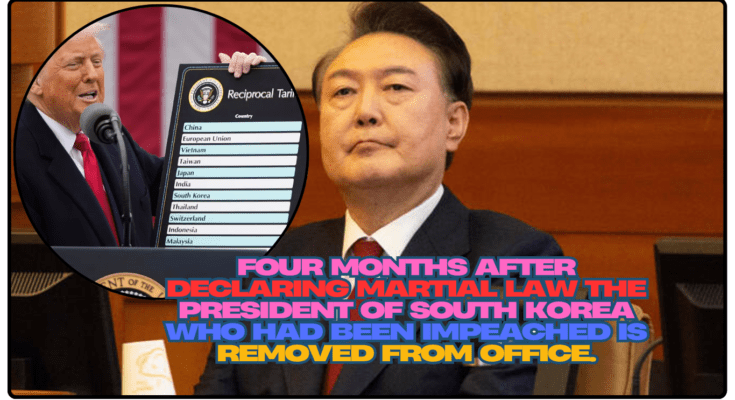South Korea’s highest court has removed embattled President Yoon Suk Yeol from office, ending months of uncertainty and legal wrangling after he briefly declared martial law in December and plunged the nation into political turmoil.
After parliament voted to impeach Yoon late last year, the court’s decision on Friday marks his formal dismissal from the presidency.
His removal takes effect right away, requiring him to leave the presidential mansion immediately and triggering an election to replace him. It is a remarkable fall from grace for the politician who was formerly a prosecutor. He rose to prominence for his role in the impeachment and subsequent imprisonment of another president many years ago, and now he finds himself in the same predicament.
The decision caps a long-running crisis has left a major global economy and key US ally rudderless at a fraught moment in world affairs, especially as US President Donald Trump’s “America First” agenda upends decades of foreign policy norms and dismantles the global trading system.
Friday’s unanimous ruling, delivered by the Constitutional Court’s eight justices, described the president’s actions as a “grave betrayal of the people’s trust.”
Moon Hyung-bae, acting head judge of the court, slammed the president for ordering soldiers to “drag out” lawmakers during the tumultuous night of December 3 and stating that such actions “cannot be justified.” Moon asserted that there was no national emergency and that such a decree was simply unlawful. Yoon was arrested in January for leading an insurrection in a separate criminal trial. In March, a court canceled his arrest warrant, but it did not drop his charges. Following Friday’s ruling, which was met with mixed reactions across the South Korean capital, Yoon thanked his supporters, stating that it was an honor to serve as leader and that he was “sorry for not being able to meet your expectations.” Outside the court, Yoon’s opponents erupted in jubilation and celebration, waving flags and dancing to music. Many had been afraid that if he were reinstated, he could declare martial law again.
But the mood was more still and somber outside Yoon’s official residence where his conservative supporters had gathered. A member of his ruling party stated that they would honor the judgment and serve the people. The issue has been hugely divisive, with major crowds taking to the streets both for and against Yoon’s removal. Before the verdict, police in the capital increased security by erecting barriers and checkpoints, issuing warnings against violence, and setting up checkpoints. What transpires next and how did we arrive here?
Many people said that Yoon’s sudden declaration of martial law brought back painful memories of South Korea’s authoritarian past before it became a flourishing democracy. His own supporters and party members were also shocked by the move. Yoon made the declaration in a surprise late-night address on television, claiming it was justified by political deadlock and threats from “anti-state forces” sympathetic to North Korea. Anxious protesters flocked to parliament in the middle of the night in a panic as lawmakers pushed past soldiers to call an emergency vote.
They were greeted by troops at the building, and dramatic videos showed lawmakers entering the area by leaping over parliament gates. By midnight, enough lawmakers had voted to overturn Yoon’s order and prevent martial law. Their determination paid off. In the end, the decree only lasted six hours. By dawn, Yoon had reversed the declaration.
This marked the beginning of four months of political chaos, during which parliament also voted to remove the acting president and prime minister. After that, Yoon said that he always planned to respect lawmakers’ will if they voted to lift the decree, and that the decree was meant to be a temporary warning to the liberal opposition. Even after his removal from office, Yoon remains dogged by other legal proceedings, including his insurrection trial. The criminal charge is punishable by life imprisonment or death, although South Korea has not executed anyone in decades.
Within sixty days of Yoon’s removal, a general election to elect a new president is required by South Korean law. The opposition leader Lee Jae-myung, a former lawyer and legislator who narrowly lost to Yoon in the 2022 presidential election, is one potential candidate for the position of president of the nation. After the court verdict, Lee thanked the people who “protected the democratic Republic of Korea,” and said they would work to restore the country’s peace and economy – and to ensure something like this never happens again.
After Yoon’s impeachment, acting president Han Duck-soo promised to ensure national security and to conduct the next election in accordance with the constitution and “the will of the people who are sovereign.” Perish from grace Yoon was a top prosecutor and a key figure in the extensive investigation into Park Geun-hye, the last president of South Korea to be impeached, before he took office in 2022. In 2017, Park was ousted from office, and in 2018, he was found guilty of corruption and abuse of power.
Yoon is currently the second president to be removed from office by the Constitutional Court and the leader elected for the shortest period of time in the nation’s democratic history. Yoon, who was once touted as a key ally by former US President Joe Biden, has experienced a dramatic decline as a result of the rapid sequence of events. During a White House state dinner in 2023, Yoon stood as the honored guest and sung Don McLean’s “American Pie” to a delighted audience.
Seoul’s strategic ties to the United States would be strengthened by Yoon’s serenade, which would demonstrate his easy rapport with Washington. However, his detractors perceived the moment as an odd distraction from pressing domestic issues. He had violent disagreements with the opposition back home, which had won the midterm elections by a wide margin and used parliament to impeach key cabinet members and stall legislation. It was this gridlock that Yoon used to try to justify his fateful decree.
More information has been added to this story.





